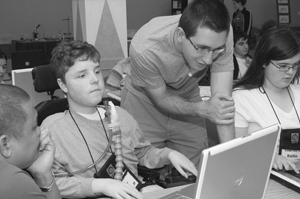Chapter Ten
Work Hard. Persevere. Be Flexible.
This thing that we call "failure" is not the falling down, but the staying down.
— Mary Pickford —
Understanding yourself, setting goals, and planning help build important foundations, but action is required to make your dreams come true. To take control of your life it is necessary to choose and take appropriate action. Take charge. Move forward (or at least move!). A pervasive drive for most people is a belief that they have control over important aspects of their lives. A belief in one's own academic ability, for example, is a reliable predictor of academic achievement.
Unless people believe that they can produce desired effects by their actions, they have little incentive to act....[Self-efficacy] beliefs influence aspirations and strength of goal commitments, level of motivation and perseverance in the face of difficulties and setbacks, resilience to adversity, quality of analytic thinking, causal attributes for successes and failures, and vulnerability to stress and depression. (Bandura, Barbaranelli, Caprara, & Pastorelli, 1996, p. 1206).
In order to become more determined, motivated, and ambitious and to find the strength to work harder and persevere, we must believe that those efforts will pay off. How can we develop more positive self-efficacy beliefs?
Our expectations about our efficacy are derived from four sources of information—performance accomplishments, vicarious experience, verbal persuasion, and physiological states (Bandura, Barbaranelli, Caprara, & Pastorelli, 1996). We can alter our self-efficacy beliefs by direct action, by the observation of others (role models), through the guidance of people (mentors) we respect who tell us that we can achieve, and through certain physical states such as relaxation.
Taking action always involves an element of risk. The importance of being willing to take a risk is reflected in this story:
I have a situation that is making me nervous. I am trying to apply for a job as a police records specialist for the city. These are people I have never worked with before and I do not know how accommodating they will be. This is also the first time I have filled out an application for employment, so I don't really know how to make it turn out right. Even if I get approved to take the examination, I do not know whether they will take the time to read the material to me or what will be on the test. If all goes well, I might be working for the city next term. I have had my insecurities when faced with new situations, but I have always been able to work around them, and it has almost always paid off. (college student who is blind)
Successful people need to advocate for themselves, work hard, and persevere.
Successful adults with disabilities demonstrate a willingness to take risks and are resilient when they encounter setbacks, keeping their eye on the ultimate goal. These individuals are also astute in selecting goals for themselves, choosing careers that capitalize on their strengths. They develop creative strategies and techniques to compensate for areas of weakness. Perhaps the most notable characteristics of this group of individuals are persistence and commitment to hard work.
The idea of working hard and long was not something to be applied occasionally but was simply a way of life. Additionally, persistence was emblematic of powerful resiliency, the ability to deal with failure by not giving up and trying again. (Reiff, Gerber, & Ginsberg, 1992, p. 15)

Young people need to take action in order to reach goals. They also need to learn from their experiences by reflecting on the outcomes of their actions. Through completing the following online activities, participants will learn the importance of:
- working hard
- taking risks
- taking action
- persevering
- learning from experiences, both successes and setbacks
- communicating effectively
- anticipating conflict and criticism
- using strategies to resolve conflicts in constructive ways
- comparing the outcome of experiences with what was expected
- reflecting on experiences in order to reach higher levels of success in the future
- making adjustments and being flexible in order to find success
- being resilient
The e-mentoring administrator can select appropriate messages from the following examples and send those with titles beginning with Mentor Tip to the mentors only and the E-Community Activity messages to the entire mentoring community. Use these examples to stimulate other ideas for online discussions. It is desirable that, ultimately, most discussions topics come from the mentors and protégés.